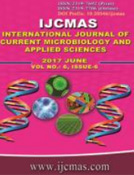


 National Academy of Agricultural Sciences (NAAS)
National Academy of Agricultural Sciences (NAAS)

|
PRINT ISSN : 2319-7692
Online ISSN : 2319-7706 Issues : 12 per year Publisher : Excellent Publishers Email : editorijcmas@gmail.com / submit@ijcmas.com Editor-in-chief: Dr.M.Prakash Index Copernicus ICV 2018: 95.39 NAAS RATING 2020: 5.38 |
Dietary starches are important sources of energy for many human societies and it is clear that they can also make quite specific contributions to health. Resistant starch has received much attention for both its potential health benefits (similar to soluble fibre) and functional properties. Resistant starch (RS) encompasses forms of starch, which are not digested in the small intestine by enzymes but fermented in the large intestine. It occurs for various reasons including chemical structure, cooking of food, chemical modification, and food mastication. Human colonic bacteria ferment RS and nonstarch polysaccharides (NSP; major components of dietary fiber) to short-chain fatty acids (SCFA), mainly acetate, propionate, and butyrate. SCFA stimulate colonic blood flow and fluid and electrolyte uptake. Resistant starch positively influences the functioning of the digestive tract, microbial flora, the blood cholesterol level, the glycemic index and assists in the control of diabetes. Apart from the potential health benefits of resistant starch, another positive advantage is its lower impact on the sensory properties of food compared with traditional sources of fibre, as whole grains, fruits or bran.
 |
 |
 |
 |
 |